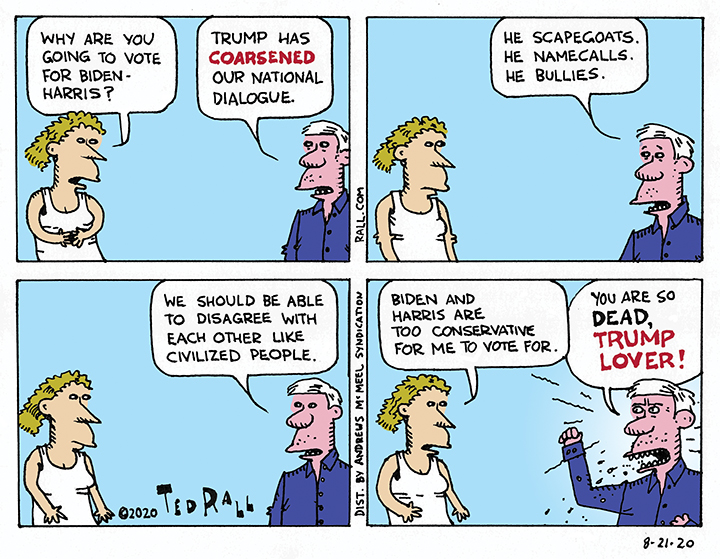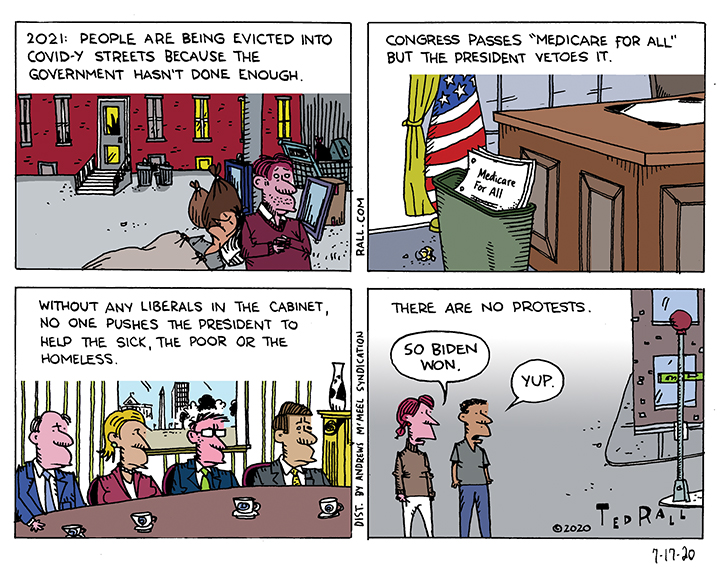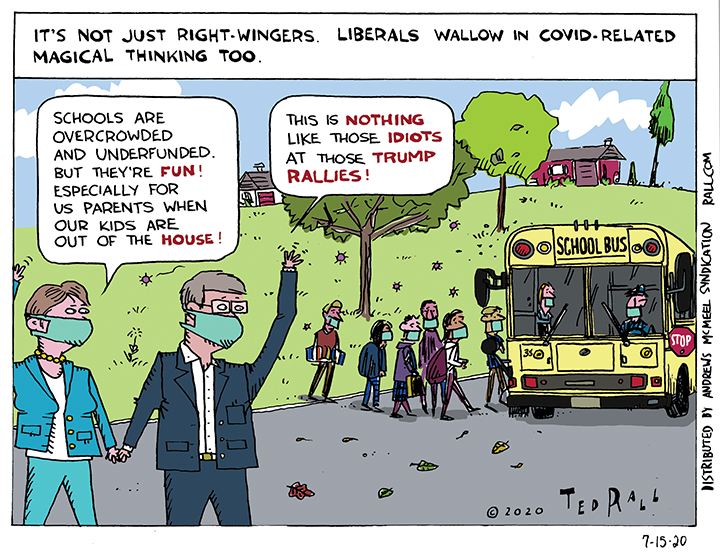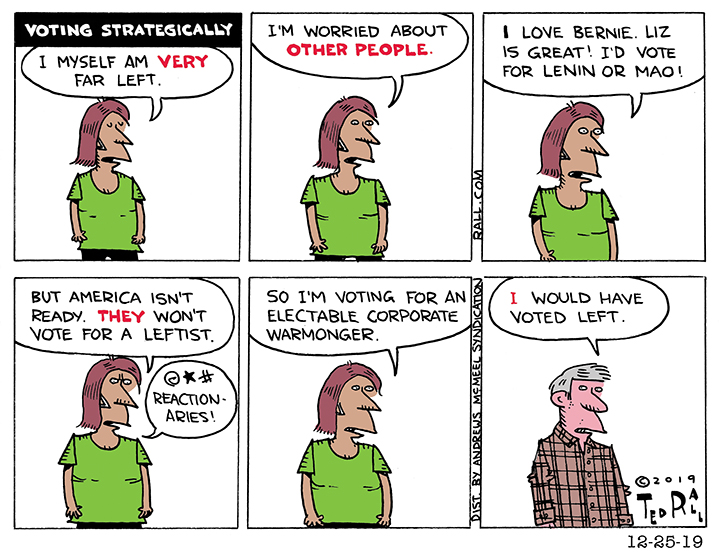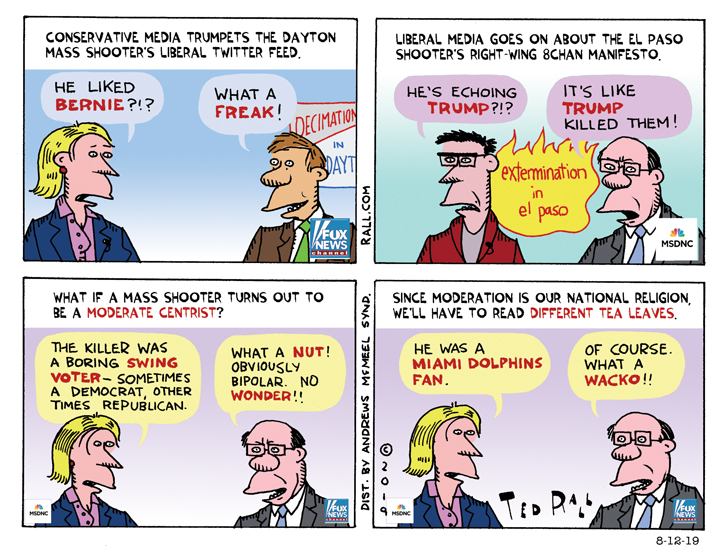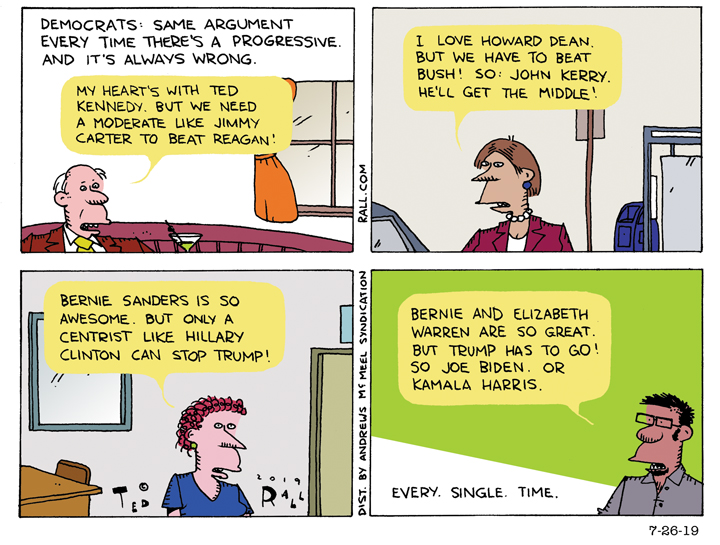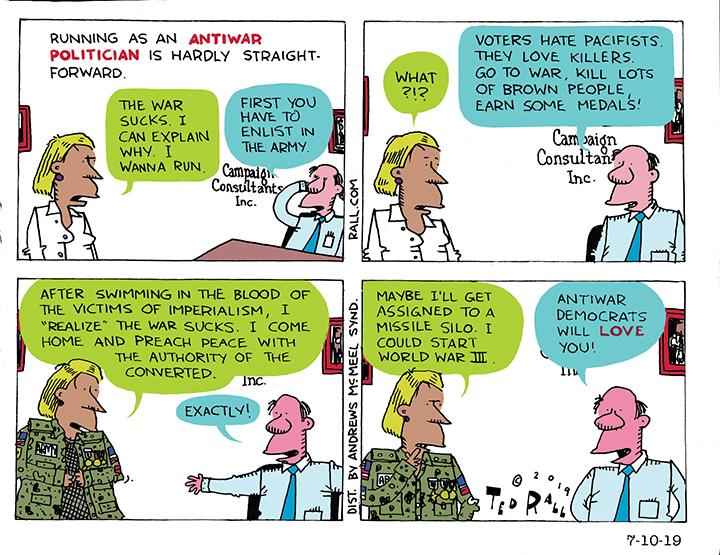Everyone is criticizing President Trump, and rightfully so, for the fact that he is so crude, belligerent and bullying to those he disagrees with. However, progressive people who are hesitant about the candidacy of Joe Biden and Kamala Harris are getting similar reactions from fellow Democrats.
What’s the Difference between a Trump Rally and a Public School?
Liberals like to make fun of ignorant conservatives for ignoring basic health protocols during the COVID-19 crisis like wearing masks and attending mass gatherings. But they have their blind spots as well. They want K-12 education as well as colleges to open up this fall even though there’s no reason to believe that they would be able to enforce social distancing.
For Progressives, Capturing the Democratic Party is More Important Than Beating Donald Trump kik
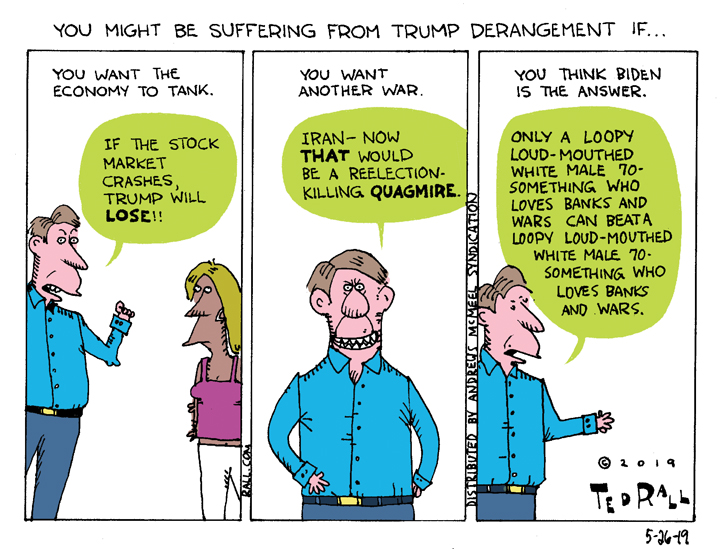
Nothing, leading Democrats say, matters more than beating Donald Trump. 2020, they argue, is the most important election of our lifetimes (OK, they always say that).
It’s not true. If you’re a progressive voter, taking back control of the Democratic Party from the DLC-Clinton-Biden centrist cabal is more important than defeating the incumbent.
For four long decades progressives—Americans who put people before profits—have been living in the political wilderness. Progressives account for 72% of Democratic voters. Figuring lefties had nowhere else to go, party leadership took them for granted, ignoring their desire for a stronger social safety net and fewer military adventures in favor of a pro-corporate agenda. What other choice did they have, vote Republican?
People who often didn’t vote turned out for Bernie Sanders’ 2016 primary campaign, proving that many non-voters weren’t apathetic. They were disgusted. After the DNC got caught pulling their usual dirty tricks, however, sabotaging Sanders in favor of Hillary Clinton, enough Bernie-or-Busters boycotted the November general election or cast protest votes for Trump to cost her the election.
Look at what happened! Progressives scored their first major win since the War on Poverty of the 1960s.
Yes, Trump has been a disaster. He is a terrible president, an international embarrassment, insane, brazenly corrupt, overtly racist, with over-the-top authoritarian tendencies.
But consider the alternative.
If Hillary Clinton were running for reelection, progressivism would still be on the outs. Like Obama, Hillary wouldn’t have appointed a single liberal, much less progressive, to her cabinet. She’s so far to the right of Trump on foreign policy that she might have gone to war against Iran. Russian national security analysts concluded that Clinton was crazy enough to start World War III. She’s equally awful on domestic stuff. Hillary is against any increase in the minimum wage. She opposes Medicare For All. She hates the Green New Deal. Her bankster backers would be running wild.
Because progressives withheld their votes in 2016, Bernie Sanders and Elizabeth Warren are the Democratic frontrunners, enjoying the combined support of 50% of primary voters. Both support a $15 minimum wage, Medicare For All, free college tuition and the Green New Deal. There is no way, no how, that those policy positions would be part of a Clinton 2020 campaign.
Progressives are so close to seizing control of the Democratic Party that they can taste it. Why, at mile 25 of this political marathon, should they let up on the pressure? They’re about to win!
If Bernie Sanders is the nominee, supporting him is a no-brainer for progressives. He’s been one of them forever. He’s trustworthy. (It’s a different calculus for leftists like me. Among other things, he needs to swear off militarism.) Progressives will vote for him.
Warren’s bonafides are squishy. She used to be a Republican, endorses capitalism and keeps Hillary on her speed dial. Is she a prog-come-lately or another fauxgressive who would sell out to Goldman Sachs? She would have to come up with some way to reassure voters that she’s more Sanders than Clinton.
But what if the DNC shoves Joe Biden or another centrist/moderate/corporatist down our throats again? As usual they’ll say that we have to pull together behind some turd in order to defeat the dastardly Donald Trump. But why?
History is clear. Lame-duck presidents don’t get big laws, new wars or much in the way of policy accomplished during their second terms. Nixon had Watergate, Reagan was hobbled by dementia and Iran Contra, Clinton was impeached because of Monica and the second Bush spent his last four years in the quagmires of Iraq and then the bursting of the subprime mortgage meltdown. Obama avoided scandal but an intransigent Republican Congress left him with little to show for years five through eight.
By 2021 Trump will almost certainly have already been impeached. Congress will probably still be Democratic. I ask my fellow Trump-haters: what exactly are you so afraid of in a second term? What do you think the president can do in a second term that he hasn’t already done? Does he strike you as the kind of person who has been plotting some big right-wing surprise to unleash in case he wins reelection?
Forget the Supreme Court-is-everything argument. As Obama proved when he refused to push for Merrick Garland, Democrats don’t move the needle. Anyway, it’s a right-wing court now. Write that sucker off.
There is a nightmare scenario: Trump dies early on. Mike Pence has three years to establish himself before running in 2024. That would really and truly suck. That is a real risk. But is fear of a Pence planet powerful enough to go back to letting the centrist scum take progressives’ votes for granted?
If the DNC robs Warren or Sanders in favor of Biden or whomever or Hillary again, Democratic progressives have little to lose by boycotting the general election again. It may be that the corporatists need to be taught the same bitter lesson a second time: without progressives there is no Democratic Party.
(Ted Rall (Twitter: @tedrall), the political cartoonist, columnist and graphic novelist, is the author of “Francis: The People’s Pope.” You can support Ted’s hard-hitting political cartoons and columns and see his work first by sponsoring his work on Patreon.)
Can We Blame Moderate Politics for the Next Mass Shooting?
Every time there’s a mass shooting, partisan members of the media scour social media and public postings to see if the perpetrator had a political agenda that they can blame as extremist and therefore responsible for the latest massacre. What’s going to happen when they find that the killer is a boring centrist moderate swing voter?
Every Single Time, Centrists Say They’ll Win. And They Never Do.
It’s the oldest debate within the Democratic Party: what to do about a progressive insurgent candidate? Whether it’s Ted Kennedy’s challenge against Jimmy Carter in 1980, Howard Dean against John Kerry in 2004 or Bernie Sanders against Hillary Clinton, moderates and centrists always say the same thing: in order to win, you need those swing voters. That means you have to pick the moderate choice. The problem with that argument is that it never really works out in the general election. Kennedy and Dean’s voters stayed home in November. 3 to 4,000,000 Bernie Sanders primary voters never showed up for Hillary Clinton. Now the same argument is being floated again, this time in favor of Joe Biden.
The Difference Between Liberals and Leftists
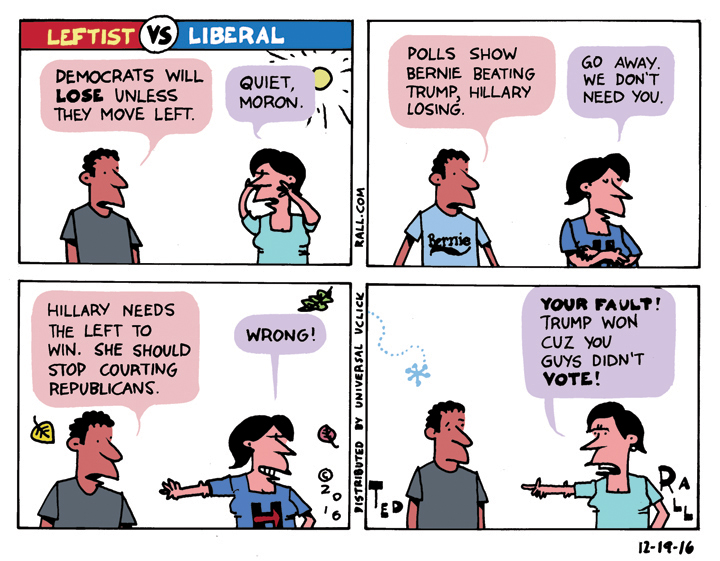
Let us now delineate the difference between liberals and leftists.
Bernie Sanders votes and caucuses with the Democratic Party, campaigns as an independent and self-identifies as a “democratic socialist”—an ideology without a party in the U.S. but that draws comparisons to Scandinavia. His stances on the issues are left of center but American politics have drifted so far right that he’s really a paleo-Democrat—there’s no daylight between Sanders 2020 and McGovern 1972. No wonder voters are confused!
Liberals and leftists want many of the same things: reduced income inequality, better working conditions, more affordable housing and healthcare. There are differences of degrees. A liberal wants the gap between rich and poor to shrink; a communist wants no class differences at all. They’re very different when it comes to foreign policy: liberals support some wars of choice whereas leftists would only turn to the military for self-defense.
Reading the last paragraph it is tempting to conclude, as I used to and many people still do, that there is enough overlap between the two to justify, even require, cooperation. Liberals and leftists both want to save the planet and the human race from climate change—why not join forces to fight the polluters and their allies the denialists?
The Nobel-winning economist Joseph Stiglitz is the ultimate liberal: a professor at Columbia, ex-chairman of the Council of Economic Advisers and former chief economist for the World Bank. An op-ed he recently published in The New York Times provides a perfect illustration of why a lasting working relationship between liberals and leftists will always be a pipe dream.
As is often the case with screeds by smart liberals, there is a lot to like in “Progressive Capitalism Is Not an Oxymoron.” (Let’s get the obvious out of the way: Yes it is.)
Stiglitz correctly identifies the problem: “Despite the lowest unemployment rates since the late 1960s, the American economy is failing its citizens. Some 90 percent have seen their incomes stagnate or decline in the past 30 years. This is not surprising, given that the United States has the highest level of inequality among the advanced countries and one of the lowest levels of opportunity.”
He correctly apportions the blame on “wealth-grabbing (or, as economists call it, rent-seeking),” businesses like hedge fund management that do not create anything but profits and the legacy of Reaganism: “Just as forces of globalization and technological change were contributing to growing inequality, we adopted policies that worsened societal inequities,” Stiglitz writes. “We relied more on markets and scaled back social protections.”
Then: “We could and should have provided more assistance to affected workers (just as we should provide assistance to workers who lose their jobs as a result of technological change), but corporate interests opposed it. A weaker labor market conveniently meant lower labor costs at home to complement the cheap labor businesses employed abroad. We are now in a vicious cycle: Greater economic inequality is leading, in our money-driven political system, to more political inequality, with weaker rules and deregulation causing still more economic inequality.” Boom! This.
Liberals like Stiglitz and leftists like me part ways when the discussion turns to solution. As Lenin asked: What is to be done?
Stiglitz answers: “It begins by recognizing the vital role that the state plays in making markets serve society. We need regulations that ensure strong competition without abusive exploitation, realigning the relationship between corporations and the workers they employ and the customers they are supposed to serve.”
“Government action is required,” he says.
We need “a new social contract between voters and elected officials, between workers and corporations, between rich and poor, and between those with jobs and those who are un- or underemployed,” he says.
Follow the link. Read the whole thing. I’ve included all the meat.
Stiglitz knows what is to be done. Mostly, he’s right. What he wants might not be enough. But it would do more good than harm.
What he does not know is how to make his proposals happen. Like the politics of all liberals, his is a toothless musing, a vacuous fantasy.
He said it himself: “Greater economic inequality is leading, in our money-driven political system, to more political inequality, with weaker rules and deregulation causing still more economic inequality.” This late-capitalism death spiral will not cure itself. There is no world in which corporations and their pet politicians and corrupt media propagandists will “recognize the vital role of the state.” They will not regulate themselves. They will not create “a new social contract.”
They are rich and powerful. The rich do not wake up one day and say to themselves, “Time to stop being a selfish ass, I’m going to redistribute my income.” The powerful do not care that the weak are miserable.
Money gets taken away from the rich one way: by force. The powerful are divested of their privileges the same way: when they have no choice.
Liberals and leftists identify many of the same problems. Only leftists understand that real solutions require serious pressure on the ruling elites. The credible threat of force—for example, a peaceful protest demonstration that could turn violent—may be enough to force reforms. But reforms always get rolled back after the left stops watching. Ultimately the rulers will have to be removed via revolution, a process that requires violence.
Liberals do not demand change; they ask nicely. Because they oppose violence and credible threats of violence, they tacitly oppose fundamental change in the existing structure of politics and society. Unlike leftists they are unwilling to risk their petty privileges in order to obtain the reforms they claim to crave. So, when push comes to shove, liberals will ultimately sell out their radical allies to the powers that be. And they will run away at the first sign of state oppression.
If you can’t trust your ally, they are no ally at all.
(Ted Rall (Twitter: @tedrall), the political cartoonist, columnist and graphic novelist, is the author of “Francis: The People’s Pope.” You can support Ted’s hard-hitting political cartoons and columns and see his work first by sponsoring his work on Patreon.)

